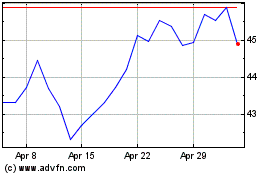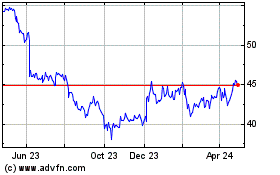Tyson Foods, Hershey and Campbell Soup crowd into the market for
dinner in a box
By Kelsey Gee
Big-food companies are following startups into the meal-kit
market, hunting for new ways to wrest back profit on ingredients
that they already make.
Tyson Foods Inc., Campbell Soup Co. and Hershey Co. are working
with online couriers to challenge meal-kit companies that ship
parcels of ingredients and recipes to consumers looking for an
easier way to cook stir-fry or enchiladas at home.
These purveyors of packaged foods and commodity meats also hope
to stem a consumer shift away from packaged foods that is
benefiting startups such as Blue Apron and HelloFresh, which source
some ingredients directly from farmers. The arrival of these
deep-pocketed rivals and their cupboard of existing products could
crowd a nascent market already showing signs of strain.
At least a half dozen meal-delivery firms have closed or
restructured this year after struggling to recoup the costs of
rapidly growing a food business from scratch. Investors have spent
$177.5 million on meal- and grocery-delivery companies this year,
Dow Jones VentureSource data shows, less than half of the $403
million spent last year.
"There has been a mass rush of people hoping to find the Uber
for food," said Gregory Chang, an investor in Din, a company that
closed in October after 18 months of selling kits inspired by items
on the menus of popular San Francisco restaurants. "There are a lot
of points along the value chain where things could fall apart."
The market is still small. Only 3% of consumers surveyed in May
by market-research firm NPD Group had tried a meal kit. They cost
$10 on average, while many consumers make dinner for an average of
$4 a person.
But the barriers to entry are relatively low for big food
makers, which have been forced to change as they battle the
perception that their products are less fresh and of lower quality
than those offered by a new guard of natural and organic
brands.
The payoff from such a foray could be worthwhile as young
shoppers spend less at the grocery stores they rely on. A January
survey by research firm Technomic showed 54% of consumers inclined
to try meal kits anticipated they would cut back on grocery-store
spending.
"We don't want meal kits to continue to cut into sales," said
Cheryl Bersin, manager of emerging technologies and e-commerce at
ConAgra Foods Inc. Sales at the grocery retailers that generate
about 85% of ConAgra's sales have declined for three consecutive
years.
The Chicago maker of Chef Boyardee in June joined with Ahold
USA's online retailer Peapod to sell kits for Buffalo chicken
quinoa and zucchini noodle primavera. Both incorporate products
such as Hunt's canned tomatoes that ConAgra normally sells at
grocery stores. "Meal kits are a tactic in the strategy needed to
combat the bigger threat of e-commerce and online grocery," said
Diana Sheehan, a director at research firm Kantar Retail.
Hershey, with startup Chef'd, in September launched dessert kits
on Facebook Live, where some food-preparation videos have attracted
millions of views.
Tyson Foods launched kits through Amazon Fresh in September,
working its chicken and beef into tacos, stews and roasts. Tyson
sells a separate line of kits at some grocery and convenience
stores.
Campbell's is also using Peapod to deliver kits to make meals
like chicken pot pie out of its cream of chicken soup and Swanson
vegetable broth.
In a Hershey video, viewed roughly 850 times, executives are
shown unpacking chocolate chips, flour satchels and vanilla vials
from an orange Chef'd box to bake cookies.
"It could be extremely profitable because Tyson already has the
protein available in house," said John Anderson, head of
food-and-beverage research at Franklin Resources Inc.'s equity
investment group.
Dominik Richter, chief executive of Berlin-based meal-kit
pioneer HelloFresh, said he isn't worried big food companies will
edge him off the turf he helped create.
HelloFresh and its rivals like Blue Apron didn't exist six years
ago. Now, more than 150 companies compete in the $1.5 billion U.S.
market, says research firm Packaged Facts.
"It's always the best product that wins. We're not scared of
anyone else coming into this market," Mr. Richter said. HelloFresh
is on track for over $600 million in revenue this year, he said,
twice what it earned in 2015. But the company lost EUR71 million
($75 million) before interest and taxes in the first nine months of
2016, while spending quickly to build its customer base, according
to its investor Rocket Internet SE.
Blue Apron Chief Executive Matt Salzberg wouldn't say whether
his company was profitable or not. The U.S. market leader, Blue
Apron has struggled with ingredient shortages and workforce issues
that led it to cut ties with three different staffing agencies.
Some startups are hedging their bets by diversifying
distribution into supermarkets as well as courier services.
Whole Foods in October began to stock $20 Purple Carrot vegan
meal kits, previously available only by home delivery. Mark
Bittman, a food writer and Purple Carrot part owner, said he isn't
convinced yet that consumers will make a permanent habit of
meal-kit cooking, no matter the company.
"I've been predicting cooking would make a comeback for 30 years
and I've been wrong for 30 years," he said.
Write to Kelsey Gee at kelsey.gee@wsj.com
(END) Dow Jones Newswires
December 06, 2016 02:47 ET (07:47 GMT)
Copyright (c) 2016 Dow Jones & Company, Inc.
Campbell Soup (NYSE:CPB)
Historical Stock Chart
From Dec 2024 to Jan 2025

Campbell Soup (NYSE:CPB)
Historical Stock Chart
From Jan 2024 to Jan 2025
